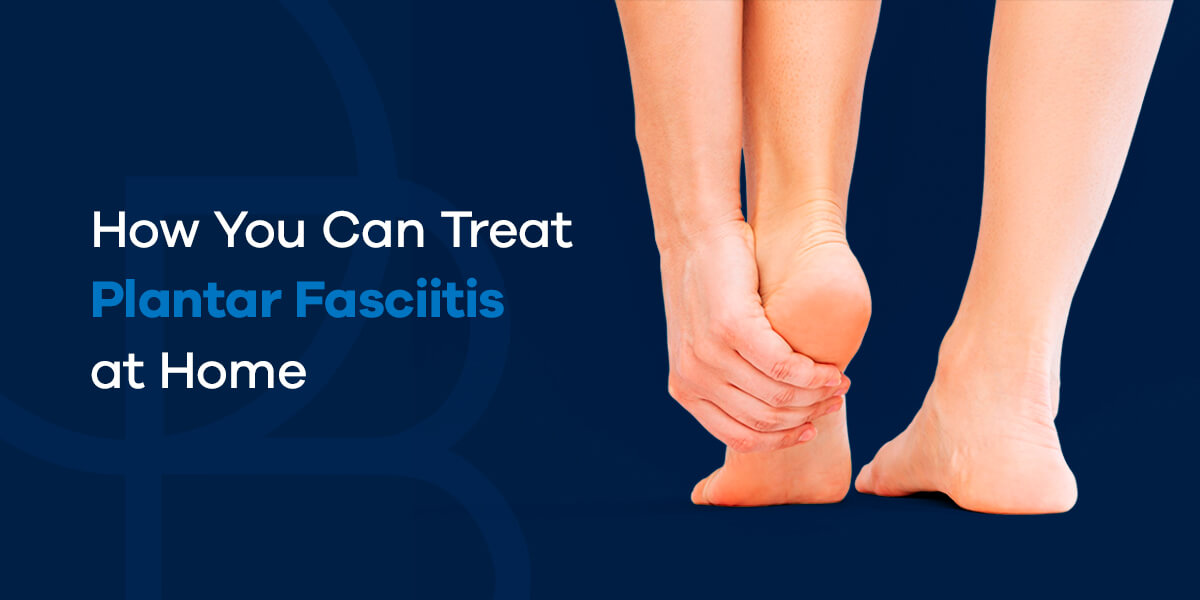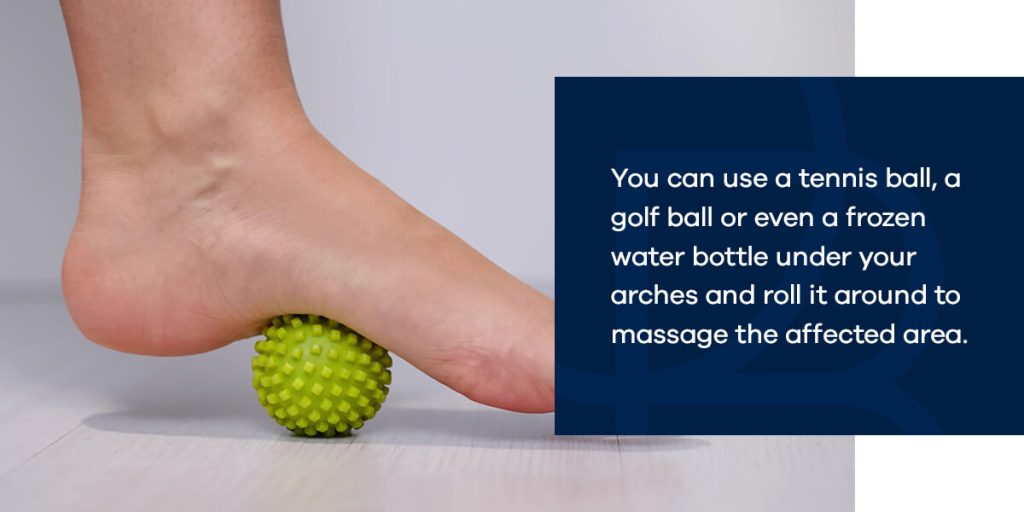
If you struggle with chronic plantar fasciitis, treating your heel pain is probably a daily concern. Unfortunately, most people work full time and find it challenging to make the time to relieve their painful symptoms.
Plantar fasciitis causes inflammation to the band of tissue connecting your heel bone to your toes and is the most common cause of heel pain. Left untreated, chronic pain can impact your ability to continue with your daily activities.
What Is Plantar Fasciitis?
The feet contain plantar fascia ligaments, which help us absorb shock as we go about our daily lives. When these ligaments become inflamed or damaged, a person can develop plantar fasciitis, which commonly causes pain in one or both heels. This pain can often get in the way of a person’s daily activities as it can cause pain while walking or putting any other kind of pressure on the foot.
Plantar fasciitis is most common between 30 and 60, and people with this condition often feel a sharp pain on their first morning steps. The pain may start to fade as you move around but can come back if you stand for a long time or stand up after sitting for a while.
While the exact cause of plantar fasciitis isn’t well understood, it’s more common in people who are overweight or are runners. Factors that can also increase inflammation or damage risk to the plantar fascia ligaments and development of the condition include:
- Increasing activity levels, particularly walking or running
- Your shoe type
- Your foot’s structure or shape
- The types of surfaces you commonly stand, walk or run on
Your doctor can help you determine if you struggle with plantar fasciitis or another condition by looking at your medical history and performing an examination. Starting treatment as soon as possible can help you find relief and return to your daily activities.
How You Can Treat Plantar Fasciitis at Home
The good news is that several simple yet effective treatments for instant plantar fasciitis relief can be done right at home or even during a quick break at work. Here are some tips to lessen and maybe even eliminate the painful symptoms caused by plantar fasciitis:
1. Watch Your Footwear
Your first line of defense with plantar fasciitis is to use proper foot support, which means finding the best shoes or even orthotics that provide adequate support. Here are a few tips on what you should wear:
- Find comfortable shoes. It may seem obvious, but if it’s uncomfortable, don’t wear it.
- Choose low- or moderate heel shoes with excellent arch support and shock absorbency.
- Avoid high heels.
- Avoid walking around barefoot on hard surfaces.
- When shoes become old or worn out, replace them.
- When you purchase new shoes, break them in gradually by wearing them around your house for 30 minutes to an hour each day. Do so for a week before wearing them out for an entire day.
- Utilize orthotics such as insoles, custom-fitted arch supports, heel cups or cushions and even night splints, which can improve your foot’s position and prevent it from pointing downward while you sleep.
2. Stretch
You can stretch your foot’s arch, calf and the other muscles around your foot and ankle to help improve your mobility and promote healing. Stretching several times daily is a simple way to elongate your plantar fascia.
3. Massage
You can soothe aching in your heels using simple and gentle massage techniques. Just press your thumbs into your heels and arches and press firmly, working from the balls of your feet toward your heel. You can also use a tennis ball, a golf ball or even a frozen water bottle under your arches and roll it around to massage the affected area.

Massaging your feet increases pressure and distracts pain receptors, letting blood flow increase in your arch and heel. It can also break down improperly healed tears on the plantar fascia ligament.
4. Apply Ice
Applying ice is an excellent method to reduce heel pain caused by plantar fasciitis quickly. Ice packs, ice cubes and even inexpensive Ice Pack Slippers — which mold to the bottom of feet — can help decrease inflammation. Be sure to cover the ice with a cloth and hold it over the painful area three to four times a day for 15 minutes at a time. Like the ball technique mentioned above, you can also roll an ice cube under your foot.
5. Rest
Sometimes, your feet just need a rest. Cut back on any activity you feel may trigger inflammation, especially high-impact sports. Your plantar fasciitis could be a sign that your feet need a break. Resting for a few days can help reduce inflammation and give the injury time to heal. If you wish to stay active, try low-impact activities like swimming.
What Not to Do With Plantar Fasciitis
While the pain that comes with this condition can be frustrating, especially if it prevents you from participating in daily activities, there are certain things you shouldn’t try to relieve the pain. Some of these “remedies” can worsen your symptoms, making it even more challenging to get on with your life. When you feel pain from plantar fasciitis, it’s essential not to:
- Exercise your feet: Participating in strenuous activity that includes running or jumping can cause a high impact on your feet, which usually worsens the condition. While you may think it can stretch your ligaments and reduce pain, high-intensity cardio, hiking and running only aggravate plantar fasciitis.
- Stay standing for long periods: Standing long-term can increase plantar fasciitis pain. If you’re required to stand for your job, try to make modifications or take plenty of time to sit and rest to reduce the pressure on your ligaments.
- Put off professional treatment: Some people think resting a few days can get them back on their feet. However, this is only a temporary remedy, and the heel pain can return. The pain can only truly subside if you seek treatment from a doctor. A medical professional can help you get to the root cause of your plantar fasciitis and find the appropriate treatment to help you find relief from your pain.
When you have plantar fasciitis, it’s essential to use the appropriate self-care and doctor-prescribed treatments to relieve your pain. You should wait to continue high-impact physical activities, such as running, until you’ve managed your condition and consulted with a professional.
When to See a Doctor About Plantar Fasciitis
If you’ve tried plantar fasciitis treatment at home for your foot pain and found no relief, it’s time to seek professional treatment. Your doctor can help you determine if your pain is from plantar fasciitis or if there’s another underlying condition contributing to your discomfort.
Your doctor may want additional testing, such as X-rays, to rule out other conditions that could cause foot pain. If they determine another cause is responsible, they can advise you on the proper treatment.
If you have severe pain from plantar fasciitis, your doctor may refer you to a physical therapist to help you build strength in your muscles and ligaments, or they could recommend steroid injections. These two treatments may coincide for a robust treatment with the best chance of relieving severe heel pain.
Meet Our Doctors Who Treat the Foot & Ankle
Our physicians have access to some of the best medical technology and techniques to help you find relief from your pain. We start with conservative treatments to help you get back to your life. We also offer additional treatments, such as cortisone steroid injections, if your condition doesn’t improve. Our physicians are dedicated to your care and can help you find the best treatment method to help you find relief.
If you still struggle with chronic pain despite attempting these home remedies for plantar fasciitis, it’s time to contact the compassionate team at OrthoBethesda. We’re proud to serve the Bethesda, MD, community with high-quality orthopedic services.

